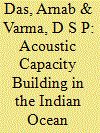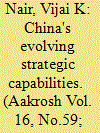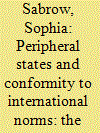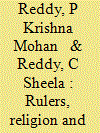| Srl | Item |
| 1 |
ID:
146595


|
|
|
|
|
| Contents |
The fractured maritime mandate in India and the involvement of multiple agencies and ministries for matters maritime, make it complicated to achieve synergy. The UWR, Goa is a defence facility under the Ministry of Defence, the Ministry of Earth Science in mandated to provide R&D support for ocean related aspects, the we have the Ministry of Shipping and Ministry of Science and Technology as other players. It is known that there are close to 17 agencies and ministries of the Government of India involved in maritime issues. The huge resource and support required for UDA is possible only when all these agencies come together for a long term commitment to enhance our UDA in the IOR. A comprehensive Maritime Strategy formulation with clear focus on UDA is the only way forward to synergise the efforts of all the possible players involved. The Make in India initiative can be leveraged to contribute significantly to the Blue Economy with a clear maritime focus backed with an effective Maritime Strategy translating to enhanced Acoustic Capability in the future.
|
|
|
|
|
|
|
|
|
|
|
|
|
|
|
|
| 2 |
ID:
119141


|
|
|
| 3 |
ID:
121777


|
|
|
|
|
| Publication |
2013.
|
| Summary/Abstract |
The power, vulnerability and destructiveness of financial markets are out of control in South Africa, now among the most unequal, economically volatile and protest-intensive countries worldwide. While debt made itself felt in many sites, of interest in both criticising and promoting solutions is the 'scale jumping' required from South Africa's national insertion into the world financial system, entailing the Reserve Bank setting very high interest rates, in turn leading to unpayable levels of consumer debt, and at a time when microfinance is suddenly discredited as a development strategy. Macro- and micro-financial problems fused in the course of the Marikana Massacre of August 2012, reflecting the local and global powers of the Moody's rating agency and 'mashonisa' loan sharks. The over-indebted Marikana mineworkers, who led a strike which catalysed many wildcat strikes elsewhere, confronted the local crisis by displacing it into the national economy. This only heightened the contradictions that Moody's punished with its September 2012 credit-rating downgrade. Without a genuine 'debt relief' solution at both scales, society will continue to unravel, as financialisation reaches its limits within one of the world's most extreme cases of uneven and combined development.
|
|
|
|
|
|
|
|
|
|
|
|
|
|
|
|
| 4 |
ID:
173913


|
|
|
|
|
| Summary/Abstract |
This paper seeks to understand the seemingly paradoxical behaviour of states of the Global South, which on one the hand conform to transnational norms in order to integrate into the international society and on the other hand (sometimes simultaneously) differentiate themselves from them. To that end, this article develops the dilemma of the marginalised in order to show that conformity and differentiation become two paradoxical strategies for marginalised actors to pursue the same goal: equality with powerful states. The transformation of the Organisation of African Unity to the African Union, where significant changes in Africa’s policy vis-à-vis global powers took place, serves as a case study to illustrate how marginalised actors struggle between conformity and differentiation in order to claim their place in the international arena. It also shows how the dilemma of the marginalised can be compelling to help us understand the predicaments of marginalised actors across vastly different situations of structural inequality. Acknowledging the dilemma helps us understand their behaviour rather than to dismiss it as irrational, thereby recognising Third World agency in shaping the international system.
|
|
|
|
|
|
|
|
|
|
|
|
|
|
|
|
| 5 |
ID:
144430


|
|
|
|
|
| Summary/Abstract |
The long-standing American policy of fighting leftist or nonaligned regimes in the Middle East through radical Islamist insurgencies has had disastrous consequences, one of the more recent being the rise of the Islamic State. P Krishna Mohan Reddy and C Sheela Reddy observe that the West now seems confused and unwilling to play a decisive role in the expanding war, which can only be settled through the mediation of the major global powers.
|
|
|
|
|
|
|
|
|
|
|
|
|
|
|
|